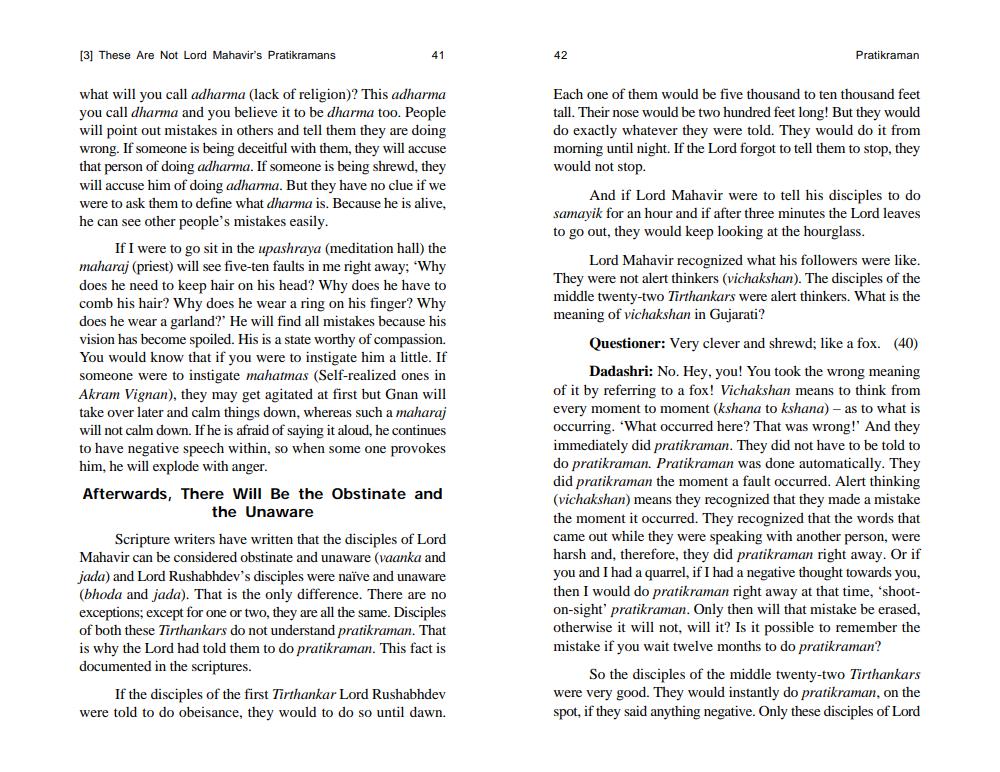________________
[3] These Are Not Lord Mahavir's Pratikramans
41
what will you call adharma (lack of religion)? This adharma you call dharma and you believe it to be dharma too. People will point out mistakes in others and tell them they are doing wrong. If someone is being deceitful with them, they will accuse that person of doing adharma. If someone is being shrewd, they will accuse him of doing adharma. But they have no clue if we were to ask them to define what dharma is. Because he is alive, he can see other people's mistakes easily.
If I were to go sit in the upashraya (meditation hall) the maharaj (priest) will see five-ten faults in me right away; 'Why does he need to keep hair on his head? Why does he have to comb his hair? Why does he wear a ring on his finger? Why does he wear a garland?' He will find all mistakes because his vision has become spoiled. His is a state worthy of compassion. You would know that if you were to instigate him a little. If someone were to instigate mahatmas (Self-realized ones in Akram Vignan), they may get agitated at first but Gnan will take over later and calm things down, whereas such a maharaj will not calm down. If he is afraid of saying it aloud, he continues to have negative speech within, so when some one provokes him, he will explode with anger.
Afterwards, There Will Be the Obstinate and the Unaware
Scripture writers have written that the disciples of Lord Mahavir can be considered obstinate and unaware (vaanka and jada) and Lord Rushabhdev's disciples were naïve and unaware (bhoda and jada). That is the only difference. There are no exceptions; except for one or two, they are all the same. Disciples of both these Tirthankars do not understand pratikraman. That is why the Lord had told them to do pratikraman. This fact is documented in the scriptures.
If the disciples of the first Tirthankar Lord Rushabhdev were told to do obeisance, they would to do so until dawn.
42
Pratikraman
Each one of them would be five thousand to ten thousand feet tall. Their nose would be two hundred feet long! But they would do exactly whatever they were told. They would do it from morning until night. If the Lord forgot to tell them to stop, they would not stop.
And if Lord Mahavir were to tell his disciples to do samayik for an hour and if after three minutes the Lord leaves to go out, they would keep looking at the hourglass.
Lord Mahavir recognized what his followers were like. They were not alert thinkers (vichakshan). The disciples of the middle twenty-two Tirthankars were alert thinkers. What is the meaning of vichakshan in Gujarati?
Questioner: Very clever and shrewd; like a fox. (40)
Dadashri: No. Hey, you! You took the wrong meaning of it by referring to a fox! Vichakshan means to think from every moment to moment (kshana to kshana) - as to what is occurring. 'What occurred here? That was wrong!" And they immediately did pratikraman. They did not have to be told to do pratikraman. Pratikraman was done automatically. They did pratikraman the moment a fault occurred. Alert thinking (vichakshan) means they recognized that they made a mistake the moment it occurred. They recognized that the words that came out while they were speaking with another person, were harsh and, therefore, they did pratikraman right away. Or if you and I had a quarrel, if I had a negative thought towards you, then I would do pratikraman right away at that time, 'shooton-sight' pratikraman. Only then will that mistake be erased, otherwise it will not, will it? Is it possible to remember the mistake if you wait twelve months to do pratikraman?
So the disciples of the middle twenty-two Tirthankars were very good. They would instantly do pratikraman, on the spot, if they said anything negative. Only these disciples of Lord




